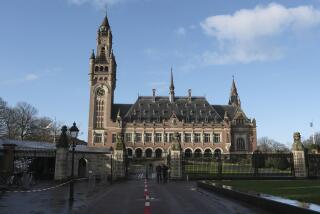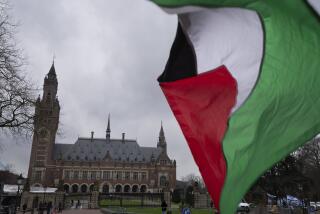U.N. court backs Kosovo’s independence
- Share via
Reporting from London — Kosovo’s declaration of independence from Serbia in 2008 did not violate international law, the United Nations’ highest court declared Thursday in a closely watched case that could have significant repercussions for secessionist movements around the world.
The opinion by the International Court of Justice, while not binding, is likely to give a big boost to the tiny Balkan country’s quest for full statehood and represents a blow to Serbia, which considers Kosovo part of its territory. At present, 69 nations, including the U.S., recognize Kosovo as a country, but a number of major powers such as Russia and China do not.
The court, based in The Hague, decided that Kosovo “did not violate general international law” in announcing itself independent in February 2008, because there are no prohibitions against such declarations.
“I expect Serbia to turn and come to us, to talk with us on so many issues of mutual interest, of mutual importance,” Kosovo’s foreign minister, Skender Hyseni told Reuters. “But such talks can only take place as talks between sovereign states.”
But Serbian President Boris Tadic rejected the court’s decision, telling reporters in Serbia’s capital, Belgrade, that his country “would never recognize the unilaterally proclaimed independence of Kosovo.”
Belgrade maintains that the region has been a fundamental component of Serbian national identity for hundreds of years and that the territory rightfully remains a Serbian province.
Belgrade lost control over Kosovo in 1999 after a bitter two-year war with the ethnic Albanians who make up the vast majority of Kosovo’s population. North Atlantic Treaty Organization warplanes intervened on the Kosovars’ behalf, mounting an aerial bombing campaign that lasted 78 days.
The area was then placed under U.N. administration. NATO peacekeeping troops continue to monitor the ceasefire.
Since then, Kosovo has increasingly functioned as more or less a separate state, with Pristina as its capital.
Its declaration of independence, however, divided international opinion. The U.S. and most of the European Union supported it, with the notable exception of Spain, which has battled its own separatist groups. Russia and China, which are also confronted with secessionist movements in places such as Chechnya and Tibet, opposed Kosovo’s independence as well.
The world court’s decision “could radically change the way we treat separatist groups in future,” said James Ker-Lindsay, an analyst at the London School of Economics. “The floodgates could be opened for a whole raft of new states to emerge. No one wants to see this happen.”
In Washington, where Vice President Joe Biden on Wednesday reaffirmed U.S. support for Kosovo’s independence during a meeting with the breakaway nation’s prime minister, the Obama administration welcomed the court opinion.
“Now it is time for Europe to unite behind a common future,” State Department spokesman Philip J. Crowley said in a statement.
But Moscow dismissed the court’s decision, saying it did not legitimize Kosovo’s independence.
Still, the opinion out of The Hague will be a significant addition to Pristina’s diplomatic arsenal as it presses more nations for official recognition. It should also provide a foundation for efforts by European diplomats to establish some sort of working relationship between Serbia and Kosovo, the absence of which has impeded Serbia’s entry into the EU.
More to Read
Sign up for Essential California
The most important California stories and recommendations in your inbox every morning.
You may occasionally receive promotional content from the Los Angeles Times.










